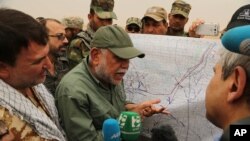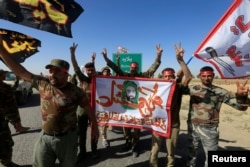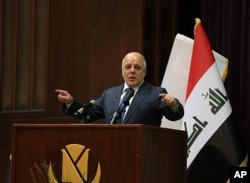The commander of Iraq's biggest Shi'ite Muslim paramilitary group told its fighters on Thursday to take their orders from the national military and cut their ties with the group's political wing.
Hadi al-Amiri, leader of the Iran-backed Badr Organization, also called on the group's fighters to withdraw from the cities under their control.
The move paves the way for Amiri to stand in parliamentary elections on May 12.
Participation in the election by members of Iraq's Iran-backed Shi'ite paramilitaries, collectively known as Popular Mobilization Forces (PMF), has been hotly debated in Iraq. PMF members cannot run for office unless they formally resign their posts.
Amiri is the second commander to issue such a call in as many days. He called on those in charge of his armed wing to cut their ties with the group's political party, which holds 22 seats in the Iraqi parliament.
"I also call on all my brothers, the commanders of various formations, to clear cities of all signs of militarization," he said in a speech.
Badr, which says it is loyal to both Iraq and Iran, is the biggest group within the PMF, which fought alongside security forces against Islamic State.
Sunni Muslims and Kurds have called on Prime Minister Haider al-Abadi, who declared victory over Islamic State last week, to disarm the PMF, which they say are responsible for widespread abuses.
The PMF were officially made part of the Iraqi security establishment by law and formally answer to Abadi in his capacity as commander-in-chief of the armed forces.
Abadi has said the state should have a monopoly on the legitimate use of arms.
Qais al-Khazali, head of Asaib Ahl al-Haq, announced a similar move on Wednesday when he said he would place his fighters under Abadi's command. The fighters and their political wing were now separate entities, he said.
Powerful Shi'ite cleric Moqtada al-Sadr set out conditions on Monday for his followers to give the government the weapons they used to fight Islamic State.
Iran-backed Harakat Hezbollah al-Nujaba, which has about 10,000 fighters and is one of the most important militias in Iraq, said last month it would give any heavy weapons it had to the military once Islamic State was defeated.







